Unit 2 A country life is a healthy life 课件
文档属性
| 名称 | Unit 2 A country life is a healthy life 课件 |
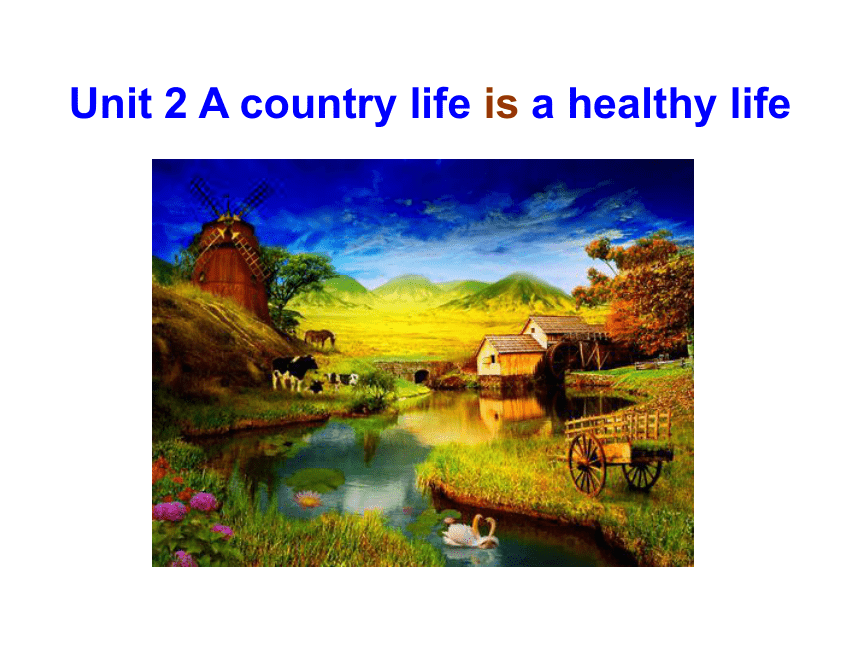
|
|
| 格式 | zip | ||
| 文件大小 | 637.6KB | ||
| 资源类型 | 教案 | ||
| 版本资源 | 教科版(广州) | ||
| 科目 | 英语 | ||
| 更新时间 | 2018-08-13 16:15:07 | ||
图片预览

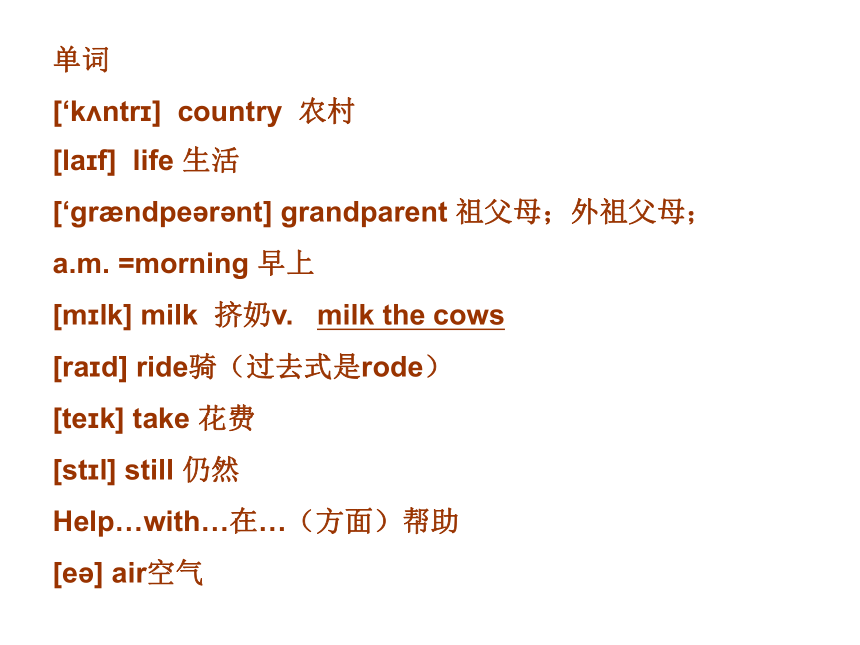
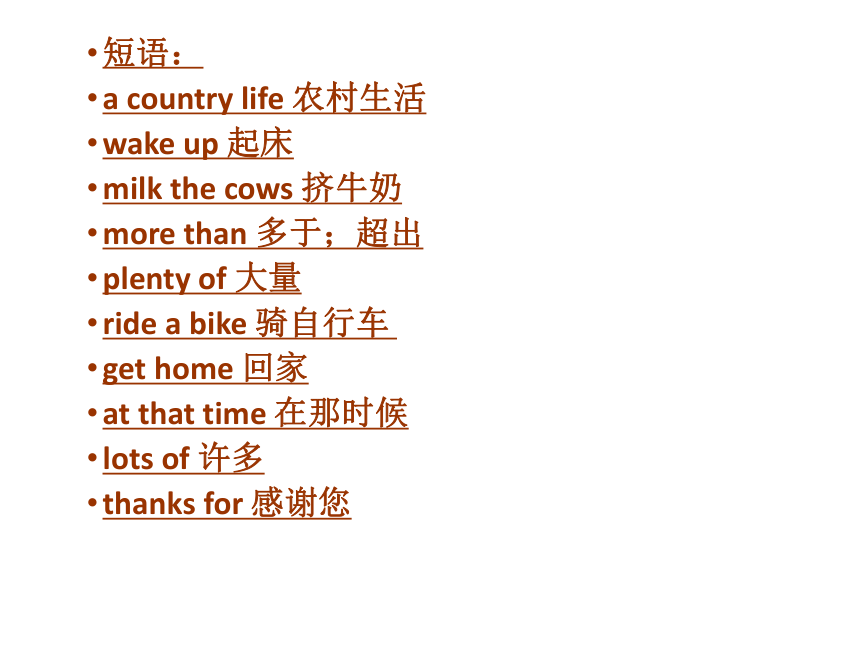

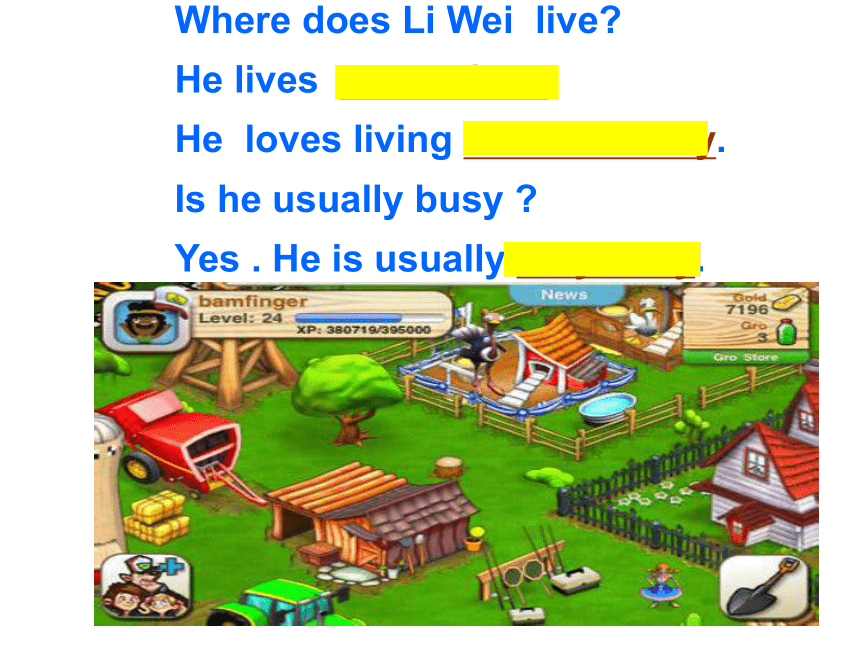
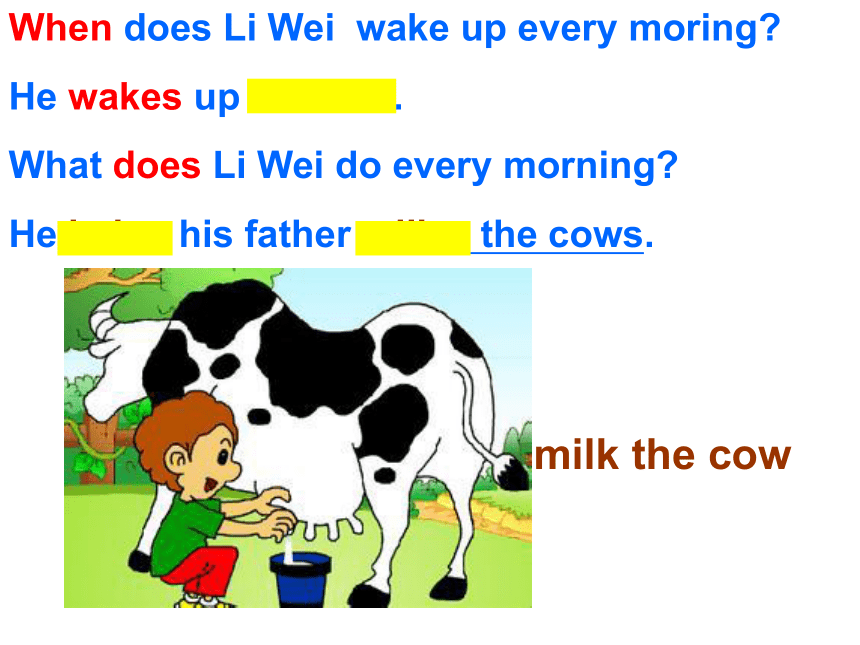
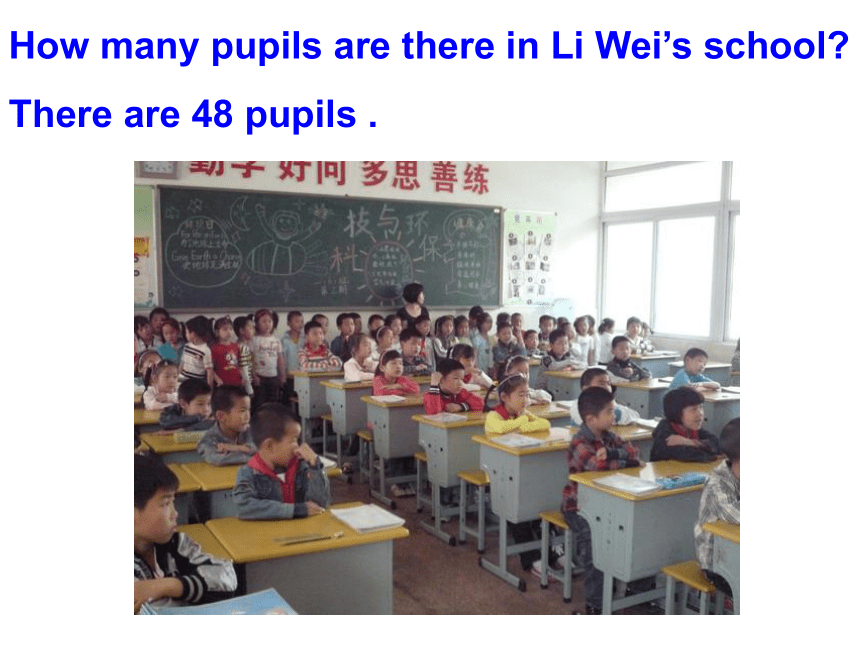
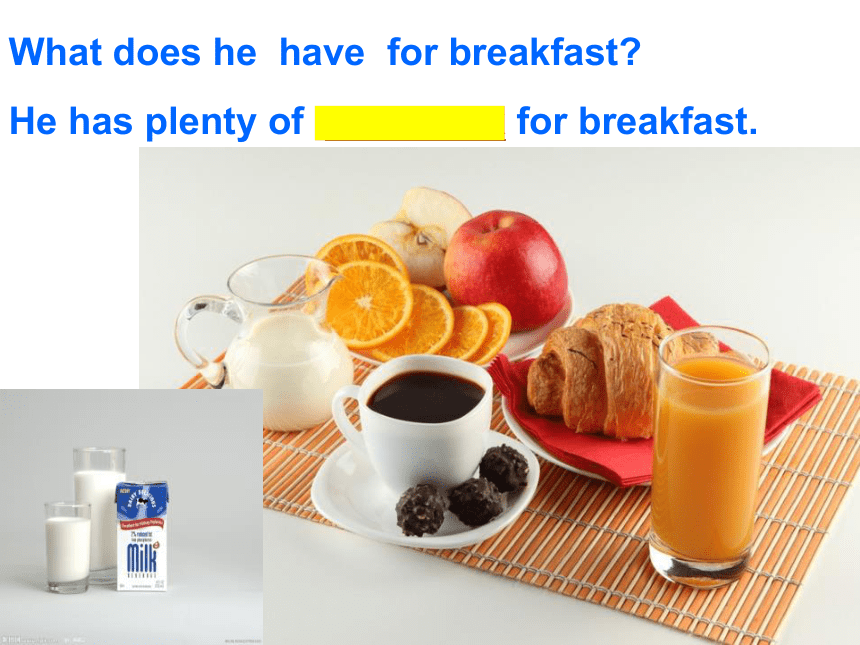
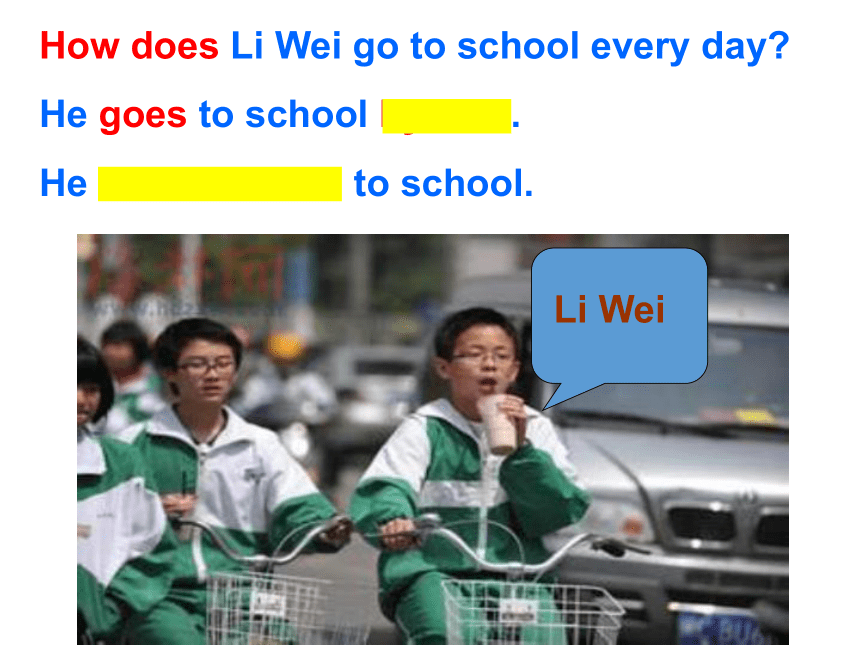

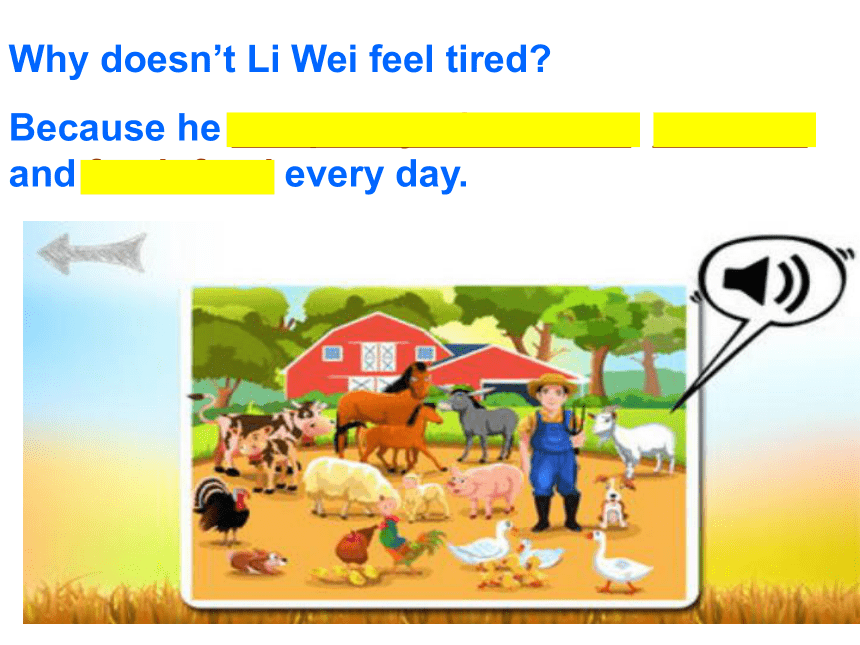

文档简介
课件41张PPT。Unit 2 A country life is a healthy life单词
[‘k?ntr?] country 农村
[la?f]? life 生活
[‘gr?ndpe?r?nt]?grandparent 祖父母;外祖父母;
a.m. =morning 早上
[m?lk] milk 挤奶v. milk the cows
[ra?d] ride骑(过去式是rode)
[te?k] take 花费
[st?l]?still?仍然
Help…with…在…(方面)帮助
[e?]?air空气短语:
a country life 农村生活
wake?up 起床
milk the cows 挤牛奶
more?than 多于;超出
plenty?of 大量
ride?a?bike 骑自行车?
get?home 回家
at?that?time 在那时候
lots?of 许多
thanks?for 感谢您PPT模板:www.1ppt.com/moban/ PPT素材:www.1ppt.com/sucai/
PPT背景:www.1ppt.com/beijing/ PPT图表:www.1ppt.com/tubiao/
PPT下载:www.1ppt.com/xiazai/ PPT教程: www.1ppt.com/powerpoint/
资料下载:www.1ppt.com/ziliao/ 范文下载:www.1ppt.com/fanwen/
试卷下载:www.1ppt.com/shiti/ 教案下载:www.1ppt.com/jiaoan/
PPT论坛:www.1ppt.cn PPT课件:www.1ppt.com/kejian/
语文课件:www.1ppt.com/kejian/yuwen/ 数学课件:www.1ppt.com/kejian/shuxue/
英语课件:www.1ppt.com/kejian/yingyu/ 美术课件:www.1ppt.com/kejian/meishu/
科学课件:www.1ppt.com/kejian/kexue/ 物理课件:www.1ppt.com/kejian/wuli/
化学课件:www.1ppt.com/kejian/huaxue/ 生物课件:www.1ppt.com/kejian/shengwu/
地理课件:www.1ppt.com/kejian/dili/ 历史课件:www.1ppt.com/kejian/lishi/ Let’s readWhere does Li Wei live?
He lives on the farm.
He loves living in the country.
Is he usually busy ?
Yes . He is usually very busy.When does Li Wei wake up every moring?
He wakes up at 5 a.m.
What does Li Wei do every morning?
He helps his father milks the cows. milk the cowHow many pupils are there in Li Wei’s school?
There are 48 pupils .What does he have for breakfast?
He has plenty of fresh milk for breakfast.How does Li Wei go to school every day?
He goes to school by bike.
He rides his bike to school.Li WeiWhat does Li Wei do after school?
He gets home and does still much work to do after school.Why doesn’t Li Wei feel tired?
Because he has plenty of exercise, clean air and fresh food every day.My name is Li Wei . I am eleven years old and I live on a small farm with my mum, dad and grandparents. I love living in the country, but I’m usually very busy.Every day I wake up at 5 a.m. and help my father milk the cows. We have more than 50 cows. So I always have plenty of fresh milk for breakfast.After breakfast I ride my bike to school. It takes about 40 minutes. My school is very small. There are 48 pupils and only one classroom. We must all learn together. When I get home after school there is much work to do. After I finish my homework. I feed our chickens and help my parents with other housework. I am always very busy but I never feel tired, because I have plenty of exercise, clean air and fresh food every day. So I think a country life is a healthy life.
重点句型:
1.?A?country?life?is?a?healthy?life.?
2.?It?takes?about?40?minutes.?
3.?I?am?always?very?busy?but?I?never?feel?tired,?because?I?have?plenty?of?exercise.?
4.?When?I?get?home?after?school,?there?is?still?much?work?to?do.? GrammarPast
过去Now
现在Future
未来一般过去时一般过去时
The Simple Past Tense 3. 结构1. 概念2.时间主语+动词的过去式表示过去某个时
间发生的动作或
存在的状态。
yesterday (…)
last night
in 1990
two days ago
just now= a moment ago nowpastfuture规则动词 过去式的构成1、一般在动词末尾加– ed
look 看
play 玩
start 开始
looked
played
started
2、结尾是 e 的动词只加 -- d
live 住在
hope 希望
use 用
lived
hoped
used
3.重读闭音节词,
先双写这个辅音字母,再加—ed
stop 停止
plan 计划stopped
planned4. 以“辅音字母+y”结尾的词,
先变“y”为“i”再加—ed
study 学习
worry 担心
say 说
studied
worried
said不规则动词 过去式的构成1.过去式与原形一样let→let(让)put→put (放下)cut → cut(砍,剪) read→read(读)let→let(让)put→put (放下)2.把元音字母变成“a”come came 来
give gave 给
drink drank 喝
begin began 开始
3.中间去“e” 末尾加“t”sleep slept 睡觉
keep kept 保持
feel felt 感觉
4.把“i”变成“o”ride rode 骑
drive drove 驾驶
shine shone 闪亮
5.结尾变成“ought”或“aught”think thought 想
buy bought 买
bring brought 带来
catch caught 抓住6.“ow”或“aw”变成“”ewknow knew 知道
throw threw 扔
draw drew 画画7.结尾”d”变“t”build built 建设
spend spent 花费(时间)
剩余不规则动词剩余不规则动词表Infinitive Past Tense
am, is
are
do
go
have
make
get
can
shall
Infinitive Past Tense
eat
say
see
stand
find was
were
did
went
had
made
got
could
should
ate
said
saw
stood
found一般过去时的基本结构①肯定句“主语+动词过去式+其他”或者“主语+was/were+其他”。
例:I?played?tennis?last?weekend.?我上周末打网球了。
②否定句“主语+didn’t+动词原形+其他”或“主语+wasn’t/weren’t+其他”。?
例:The?girl?didn’t?play?computer?games?yesterday?afternoon.?这个女孩昨 天下午没玩电子游戏。③一般疑问句“Did+主语+动词原形+其他?”
肯定回答为“Yes,主语+did”
否定回答为“No,主语+didn’t”
例:—?Did?you?go?to?the?beach?????你们去海滩了吗??
—?Yes,?we?did./No,?we?didn’t.????是的,我们去了。/不,我们 没有。
④Was/Were+主语+其他?”
肯定回答为“Yes,主语+was/were”,
否定回答为“No,主语+wasn’t/weren’t”。?
?例:—?Was?your?weekend?OK?????你的周末过得还行吧??
—?Yes,?it?was./No,?it?wasn’t.???是的,还行。/不,不行。? ⑤特殊疑问句:特殊疑问词+一般疑问句(顺序)?
例:
—?What?did?Li?Lei?do?last?weekend????李雷上周末干什么了??
—?He?visited?his?grandparents.??????他去看了他的祖父母。
livelive?in?+?大地点??????
live?at?+?小地点(如街道、街区等)?????
live?on?+?楼层?
help?sb with?sthhelp?sb.?(to)?do?sth.????帮助某人做某事????????
help?sb.?with?sth.????帮助某人做某事?
more?than①more?than+数词?????超过,多于?
如:more?than?thirty?students?are?boys?in?our?class.???
②more?than?+?名词????不仅仅是?
如:Joe?is?more?than?a?writer;?he?is?a?cook,?too.?
③more?than?+?形容词????很,非常?
如:I’m?more?than?happy?to?see?you.?
[‘k?ntr?] country 农村
[la?f]? life 生活
[‘gr?ndpe?r?nt]?grandparent 祖父母;外祖父母;
a.m. =morning 早上
[m?lk] milk 挤奶v. milk the cows
[ra?d] ride骑(过去式是rode)
[te?k] take 花费
[st?l]?still?仍然
Help…with…在…(方面)帮助
[e?]?air空气短语:
a country life 农村生活
wake?up 起床
milk the cows 挤牛奶
more?than 多于;超出
plenty?of 大量
ride?a?bike 骑自行车?
get?home 回家
at?that?time 在那时候
lots?of 许多
thanks?for 感谢您PPT模板:www.1ppt.com/moban/ PPT素材:www.1ppt.com/sucai/
PPT背景:www.1ppt.com/beijing/ PPT图表:www.1ppt.com/tubiao/
PPT下载:www.1ppt.com/xiazai/ PPT教程: www.1ppt.com/powerpoint/
资料下载:www.1ppt.com/ziliao/ 范文下载:www.1ppt.com/fanwen/
试卷下载:www.1ppt.com/shiti/ 教案下载:www.1ppt.com/jiaoan/
PPT论坛:www.1ppt.cn PPT课件:www.1ppt.com/kejian/
语文课件:www.1ppt.com/kejian/yuwen/ 数学课件:www.1ppt.com/kejian/shuxue/
英语课件:www.1ppt.com/kejian/yingyu/ 美术课件:www.1ppt.com/kejian/meishu/
科学课件:www.1ppt.com/kejian/kexue/ 物理课件:www.1ppt.com/kejian/wuli/
化学课件:www.1ppt.com/kejian/huaxue/ 生物课件:www.1ppt.com/kejian/shengwu/
地理课件:www.1ppt.com/kejian/dili/ 历史课件:www.1ppt.com/kejian/lishi/ Let’s readWhere does Li Wei live?
He lives on the farm.
He loves living in the country.
Is he usually busy ?
Yes . He is usually very busy.When does Li Wei wake up every moring?
He wakes up at 5 a.m.
What does Li Wei do every morning?
He helps his father milks the cows. milk the cowHow many pupils are there in Li Wei’s school?
There are 48 pupils .What does he have for breakfast?
He has plenty of fresh milk for breakfast.How does Li Wei go to school every day?
He goes to school by bike.
He rides his bike to school.Li WeiWhat does Li Wei do after school?
He gets home and does still much work to do after school.Why doesn’t Li Wei feel tired?
Because he has plenty of exercise, clean air and fresh food every day.My name is Li Wei . I am eleven years old and I live on a small farm with my mum, dad and grandparents. I love living in the country, but I’m usually very busy.Every day I wake up at 5 a.m. and help my father milk the cows. We have more than 50 cows. So I always have plenty of fresh milk for breakfast.After breakfast I ride my bike to school. It takes about 40 minutes. My school is very small. There are 48 pupils and only one classroom. We must all learn together. When I get home after school there is much work to do. After I finish my homework. I feed our chickens and help my parents with other housework. I am always very busy but I never feel tired, because I have plenty of exercise, clean air and fresh food every day. So I think a country life is a healthy life.
重点句型:
1.?A?country?life?is?a?healthy?life.?
2.?It?takes?about?40?minutes.?
3.?I?am?always?very?busy?but?I?never?feel?tired,?because?I?have?plenty?of?exercise.?
4.?When?I?get?home?after?school,?there?is?still?much?work?to?do.? GrammarPast
过去Now
现在Future
未来一般过去时一般过去时
The Simple Past Tense 3. 结构1. 概念2.时间主语+动词的过去式表示过去某个时
间发生的动作或
存在的状态。
yesterday (…)
last night
in 1990
two days ago
just now= a moment ago nowpastfuture规则动词 过去式的构成1、一般在动词末尾加– ed
look 看
play 玩
start 开始
looked
played
started
2、结尾是 e 的动词只加 -- d
live 住在
hope 希望
use 用
lived
hoped
used
3.重读闭音节词,
先双写这个辅音字母,再加—ed
stop 停止
plan 计划stopped
planned4. 以“辅音字母+y”结尾的词,
先变“y”为“i”再加—ed
study 学习
worry 担心
say 说
studied
worried
said不规则动词 过去式的构成1.过去式与原形一样let→let(让)put→put (放下)cut → cut(砍,剪) read→read(读)let→let(让)put→put (放下)2.把元音字母变成“a”come came 来
give gave 给
drink drank 喝
begin began 开始
3.中间去“e” 末尾加“t”sleep slept 睡觉
keep kept 保持
feel felt 感觉
4.把“i”变成“o”ride rode 骑
drive drove 驾驶
shine shone 闪亮
5.结尾变成“ought”或“aught”think thought 想
buy bought 买
bring brought 带来
catch caught 抓住6.“ow”或“aw”变成“”ewknow knew 知道
throw threw 扔
draw drew 画画7.结尾”d”变“t”build built 建设
spend spent 花费(时间)
剩余不规则动词剩余不规则动词表Infinitive Past Tense
am, is
are
do
go
have
make
get
can
shall
Infinitive Past Tense
eat
say
see
stand
find was
were
did
went
had
made
got
could
should
ate
said
saw
stood
found一般过去时的基本结构①肯定句“主语+动词过去式+其他”或者“主语+was/were+其他”。
例:I?played?tennis?last?weekend.?我上周末打网球了。
②否定句“主语+didn’t+动词原形+其他”或“主语+wasn’t/weren’t+其他”。?
例:The?girl?didn’t?play?computer?games?yesterday?afternoon.?这个女孩昨 天下午没玩电子游戏。③一般疑问句“Did+主语+动词原形+其他?”
肯定回答为“Yes,主语+did”
否定回答为“No,主语+didn’t”
例:—?Did?you?go?to?the?beach?????你们去海滩了吗??
—?Yes,?we?did./No,?we?didn’t.????是的,我们去了。/不,我们 没有。
④Was/Were+主语+其他?”
肯定回答为“Yes,主语+was/were”,
否定回答为“No,主语+wasn’t/weren’t”。?
?例:—?Was?your?weekend?OK?????你的周末过得还行吧??
—?Yes,?it?was./No,?it?wasn’t.???是的,还行。/不,不行。? ⑤特殊疑问句:特殊疑问词+一般疑问句(顺序)?
例:
—?What?did?Li?Lei?do?last?weekend????李雷上周末干什么了??
—?He?visited?his?grandparents.??????他去看了他的祖父母。
livelive?in?+?大地点??????
live?at?+?小地点(如街道、街区等)?????
live?on?+?楼层?
help?sb with?sthhelp?sb.?(to)?do?sth.????帮助某人做某事????????
help?sb.?with?sth.????帮助某人做某事?
more?than①more?than+数词?????超过,多于?
如:more?than?thirty?students?are?boys?in?our?class.???
②more?than?+?名词????不仅仅是?
如:Joe?is?more?than?a?writer;?he?is?a?cook,?too.?
③more?than?+?形容词????很,非常?
如:I’m?more?than?happy?to?see?you.?
同课章节目录
- Module 1 Country life
- Unit 1 What are those farmers doing?
- Unit 2 A country life is a healthy life
- Module 2 City life
- Unit 3 Where are you from?
- Unit 4 I like the city very much
- Module 3 Health
- Unit 5 What's the matter with you?
- Unit 6 The secret of good health
- Module 4 Past experiences
- Unit 7 What did you do yesterday?
- Unit 8 A trip to Hong Kong
- Module 5 Changes
- Unit 9 Was I a good girl back then?
- Unit 10 Then and now
- Module 6 Festivals
- Unit 11 I like the Spring Festival best
- Unit 12 Other festival in China
- Unit 12 Christmas(旧版)
- Module 7 Let's look back
